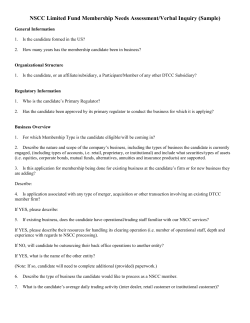
DTCC CAPITAL MANAGEMENT STATEMENT
SUSAN COSGROVE Managing Director and Chief Financial Officer 55 WATER STREET NEW YORK, NY 10041-0099 TEL: 212 855 7612 scosgrove@dtcc.com www.dtcc.com DTCC CAPITAL MANAGEMENT STATEMENT April 2015 Capital Management DTCC considers capital management integral to financial stability. DTCC’s capital management strategy is a priority for the firm and helps the organization maintain a strong financial position by: • Determining the amount of financial resources sufficient to support both current and forecasted needs; • Ensuring that DTCC and its operating subsidiaries, particularly the three core clearing agencies that have been designated as Systemically Important Financial Market Utilities (SIFMUs) – The Depository Trust Company (DTC), Fixed Income Clearing Corporation (FICC) and National Securities Clearing Corporation (NSCC) – maintain adequate capital to protect against risks that may arise under adverse scenarios; • Satisfying current and anticipated regulatory capital requirements in light of strengthened global risk management standards for financial market utilities in markets in which the SIFMUs and other DTCC regulated subsidiaries operate; • Supporting strong credit ratings, particularly for the SIFMU subsidiaries and the holding company; and • Maintaining access to financial resources for strategic growth opportunities. Financial Planning and Capital Framework DTCC maintains a disciplined approach to financial planning and management, which it views as a critical element to sustainability of the firm’s operations and to its capital planning process. Key aspects of this approach include DTCC’s annual budget process; business line performance reviews with management; development of a three-year long-range financial plan; monthly cash flow projections based on earnings estimates and financial forecasting; and regular review of capital requirements at the individual operating subsidiary level, including the SIFMUs, as well as DTCC on a consolidated basis. These elements are brought together to create a comprehensive financial plan that projects DTCC’s ability to generate the required level of earnings and cash flows to protect against business risks and to support overall business strategies. DTCC has developed a robust capital framework, comprised of regulatory, economic and strategic components designed to comprehensively assess its capital needs. DTCC’s capital framework was developed under the supervision of the Finance/Capital Committee of the Board of Directors, which was established to facilitate the oversight of DTCC’s financial strategy and assess performance against that strategy. DTCC’s regulatory capital framework was developed using guidance from the 2012 CPMI-IOSCO Principles for Financial Market Infrastructures (PFMIs), which outlined international guidelines for, among other things, core risk management standards for financial utilities. DTCC has also taken into consideration the Securities and Exchange Commission’s proposed Covered Clearing Agency Standards, as well as using guidance from the Federal Reserve’s revised Regulation HH (Reg HH) risk management standards, both of which are largely aligned to the PFMIs. DTCC has incorporated key elements of these standards into its capital framework, particularly those related to Principle 15 (General Business Risk), which outlines minimum capital requirements. Central to Principle 15 is the concept that a financial market infrastructure should hold liquid net assets funded by equity such that it is able to maintain operations for an extended period should it experience general business losses, with the minimum standard equivalent to at least six months of operating expenses. Furthermore, Principle 15 requires a financial market infrastructure to maintain a viable plan for raising additional equity should its equity fall close to or below the minimum amount needed. DTCC is in the process of developing a comprehensive plan to address this requirement as part of its recovery and resolution planning initiatives. Additionally, DTCC has developed its own economic capital framework, which estimates capital requirements on a consolidated basis across core risk categories; specifically, business risk, market risk, credit risk and operational risk. Management believes that an economic risk-based capital view of the firm’s total business portfolio is an important assessment tool to complement regulatory mandates, which are focused on specific DTCC subsidiaries. Under this framework, DTCC is able to evaluate potential stress scenarios to more fully assess its capital requirements in terms of economic realities during potential periods of market downturns and contraction. DTCC also has established a strategic component within its capital framework, which is an assessment of the capital needed to support DTCC’s business growth and new strategic initiatives. Regulatory Capital DTCC’s regulated subsidiaries maintain and report regulatory capital in accordance with all relevant laws, rules and guidelines. As a multinational enterprise, various DTCC subsidiaries are subject to regulatory capital regimes, which are supervised and examined, as applicable, by the Federal Reserve Bank of New York (FED), the New York State Department of Financial Services (NYS DFS), and the U.S. Commodity Futures Trading Commission (CFTC) in the United States; ESMA in the European Union; the Japan Financial Services Agency (JFSA) in Japan; and the Monetary Authority of Singapore (MAS) in Singapore. Additionally, assuming implementation of draft SEC Rule 17Ad – 22(e)(15), DTCC’s SIFMUs will be required to maintain and report regulatory capital according to the SEC’s implementation of PFMI Principle 15 into its revised Clearing Agency Standards. DTCC banking subsidiaries are subject to capital requirements of applicable state and Federal law and regulation. At December 31, 2014, DTCC operated two subsidiaries with banking licenses: DTC and The Warehouse Trust Company (WTC), each a limited purpose trust company under the Banking Law of New York State. As required, DTC and WTC measure capital adequacy based on Tier 1 capital and total capital ratios. At December 31, 2014, DTC maintained a Tier 1 and total capital ratio of 66.6% and WTC maintained a Tier 1 and total capital ratio of 221.9%, each in excess of the well-capitalized standards for these ratios established by the Federal Reserve, which are 4% and 8%, respectively. Susan Cosgrove DTCC Managing Director and Chief Financial Officer
© Copyright 2025













